
Forensische Psychiatrie Psychologie Kriminologie
Scope & Guideline
Exploring the Nexus of Law, Psychology, and Psychiatry.
Introduction
Aims and Scopes
- Forensic Psychiatry and Mental Health:
Research focusing on the intersection of psychiatric disorders and criminal behavior, including treatment methodologies, risk assessment, and the implications of mental health on legal responsibility. - Criminological Analysis and Policy:
Investigations into criminal behavior, including empirical studies on recidivism, radicalization, and the effectiveness of legal and rehabilitative measures. - Treatment Innovations in Forensic Settings:
Exploration of new and effective treatment approaches for offenders, particularly those with mental health issues, including addiction treatments and therapeutic alliances. - Legal Frameworks and Amendments:
Examination of legal statutes, amendments, and their implications for practice in forensic settings, including discussions on the German Criminal Code. - Impact of Sociocultural Factors:
Studies on how social dynamics, such as gender, age, and cultural background, influence criminal behavior and treatment outcomes. - COVID-19 Implications in Forensic Settings:
Research addressing the effects of the COVID-19 pandemic on mental health, prison systems, and rehabilitation processes.
Trending and Emerging
- Innovations in Forensic Addiction Treatment:
Recent articles emphasize new treatment modalities for addiction within forensic settings, highlighting the need for tailored interventions that comply with legal frameworks. - Impact of COVID-19 on Forensic Systems:
The pandemic's effects on mental health, prison conditions, and rehabilitation processes have become a central theme, reflecting the urgency of understanding and addressing these challenges. - Empirical Studies on Recidivism and Rehabilitation:
A growing focus on empirically validating treatment outcomes and recidivism risk factors, utilizing sophisticated methodologies to enhance the understanding of offender behavior. - Intersectionality in Forensic Contexts:
Emerging research is increasingly addressing intersectional factors, such as race, gender identity, and socio-economic status, in understanding criminal behavior and treatment efficacy. - Technological Impacts on Forensic Practices:
The integration of technology in forensic assessment and treatment, including the use of digital tools for therapy and risk assessment, is gaining traction. - Focus on Therapeutic Alliances:
There is an increasing emphasis on the importance of building therapeutic relationships in treatment settings, particularly for individuals with antisocial personality disorders.
Declining or Waning
- Traditional Gender Perspectives:
Research focusing on binary gender roles and their implications in forensic contexts appears to have waned, as more recent studies explore broader sociocultural dynamics and inclusivity. - Historical Analyses of Criminal Behavior:
While historical perspectives on criminal justice and psychiatry were once prevalent, there seems to be a decreasing emphasis on these themes in favor of contemporary issues and empirical studies. - General Discussions on Prostitution:
Earlier publications extensively covered prostitution from various angles, but recent trends indicate a shift towards more specific aspects, such as the impact of technology and social conditions on sexual exploitation. - Basic Descriptive Studies:
There is a noticeable decline in the publication of basic descriptive studies lacking empirical depth, as the journal increasingly favors innovative methodologies and data-driven research. - General Risk Factors for Recidivism:
Research that broadly categorizes risk factors for recidivism without specific context or empirical backing has become less common, reflecting a shift towards more nuanced and contextually rich studies.
Similar Journals

Recht & Psychiatrie
Advancing Understanding at the Nexus of Law and Psychiatry.Recht & Psychiatrie, published by PSYCHIATRIE VERLAG GMBH, is a prominent journal that bridges the critical fields of law and psychiatry. With an ISSN of 0724-2247, this journal has been a vital resource for legal and mental health professionals since its inception in 1999, although its coverage in Scopus was discontinued in 2019. The journal has consistently ranked within the 71st percentile in Social Sciences law and offers valuable insights into the intersection of legal frameworks and psychiatric practice. While it currently does not provide open access options, researchers and professionals can benefit from its rigorous, peer-reviewed articles that address contemporary issues at the nexus of law and mental health. Based in Köln, Germany, Recht & Psychiatrie continues to contribute significantly to the discourse surrounding health policy and mental health jurisprudence, making it an essential resource for anyone engaged in the study or practice of these interconnected domains.

International Journal of Forensic Mental Health
Innovating Insights in Forensic Mental HealthThe International Journal of Forensic Mental Health is a prominent platform for scholarly discourse in the intersecting realms of forensic science, psychiatry, and mental health. Published by Routledge Journals, Taylor & Francis Ltd in the United Kingdom, this journal boasts an ISSN of 1499-9013 and an E-ISSN of 1932-9903. It serves as a critical resource for researchers, clinicians, and students aiming to explore the complexities of mental health within forensic contexts. With a publication span from 2002 to 2024, the journal has secured its place in Q3 quartiles for both Pathology and Forensic Medicine, as well as Psychiatry and Mental Health, showcasing its contribution to advancing knowledge in these vital areas. The journal is indexed in Scopus, with respectable rankings that reflect its importance and reach: 18th out of 45 in Psychiatric Mental Health and 103rd out of 208 in Pathology and Forensic Medicine. While not currently offering Open Access, it continues to provide valuable insights and research findings that significantly impact clinical practices and forensic policies worldwide.
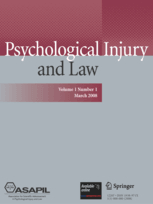
Psychological Injury & Law
Navigating the Intricacies of Law and Mental WellnessPsychological Injury & Law, published by SPRINGER, stands at the forefront of interdisciplinary research, merging insights from the fields of law, psychology, and mental health. With an ISSN of 1938-971X and an E-ISSN of 1938-9728, this esteemed journal aims to address the complexities of psychological injuries within legal contexts, providing a platform for scholars to explore the intersection of legal principles and psychological well-being. Recognized for its rigor, it has achieved a Q1 ranking in both Ecology and Law, and a Q2 ranking in Psychiatry and Mental Health for 2023, demonstrating its influence and contribution to these fields. Additionally, with impressive Scopus ranks placing it in the 95th percentile within Social Sciences (Law) and the 70th percentile in Medicine (Psychiatry and Mental Health), the journal consistently showcases high-quality, impactful research that resonates with professionals, academics, and students alike. By fostering a deeper understanding of psychological injuries, it serves as an essential resource for those seeking to navigate the intricate relationships between mental wellness and legal frameworks.

INTERNATIONAL JOURNAL OF OFFENDER THERAPY AND COMPARATIVE CRIMINOLOGY
Connecting theory and practice in offender rehabilitation.INTERNATIONAL JOURNAL OF OFFENDER THERAPY AND COMPARATIVE CRIMINOLOGY, published by SAGE PUBLICATIONS INC, is a leading journal in the fields of criminology, psychology, and forensic medicine, with a robust legacy dating back to 1966. With ISSN 0306-624X and E-ISSN 1552-6933, this journal presents innovative research and theoretical discussions that seek to improve offender rehabilitation and comparative criminological studies. The journal’s high-impact contributions have garnered it a prestigious Q1 ranking in Arts and Humanities and a Q2 ranking in Pathology and Forensic Medicine as of 2023, making it a valuable resource for scholars and practitioners alike. Researchers will find the journal's commitment to advancing knowledge through empirical evidence and critical analysis particularly compelling, as it addresses contemporary challenges in offender therapy. Though not an Open Access journal, its diverse scope ensures that readers have access to pivotal insights that drive progress and inform policy in justice and rehabilitation systems. With a focus on interdisciplinary approaches, the journal serves as an essential platform for academics, professionals, and students aiming to deepen their understanding of comparative criminology and its applications.
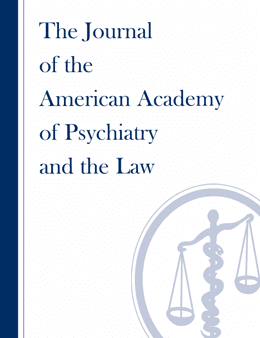
JOURNAL OF THE AMERICAN ACADEMY OF PSYCHIATRY AND THE LAW
Transforming Understanding in Psychiatry and LawJOURNAL OF THE AMERICAN ACADEMY OF PSYCHIATRY AND THE LAW, published by the American Academy of Psychiatry and Law, is a pivotal resource for researchers and professionals engaged in the intersection of mental health, law, and forensic evaluation. With an ISSN of 1093-6793 and an E-ISSN of 1943-3662, this journal has been at the forefront of disseminating critical findings and discussions since 1997, now extending through 2024. Positioned within the Q3 category for Medicine (miscellaneous), Pathology and Forensic Medicine, and Psychiatry and Mental Health, it highlights its significance within these disciplines. Although the journal currently operates under a traditional access model, it remains a valuable platform for scholarly articles that inform practice and elevate understanding of legal psychiatry. Researchers are encouraged to explore its contents to stay abreast of contemporary issues and advancements in forensic psychiatry, making it an indispensable resource for education and practice.

Revija za Kriminalistiko in Kriminologijo
Bridging Disciplines in Criminal Justice ResearchRevija za Kriminalistiko in Kriminologijo is a prominent academic journal dedicated to the fields of criminalistics, criminology, law, and forensic medicine, published by the Ministry of Interior Republic Slovenia. With its inception in 1981, the journal has served as a pivotal platform for disseminating research findings and innovative ideas relevant to crime and justice issues, particularly in the context of Slovenia and the wider region. Despite its current Q4 ranking in various categories, including Law and Pathology & Forensic Medicine, Revija za Kriminalistiko in Kriminologijo remains essential for emerging scholars and professionals seeking to contribute to the discourse in forensic science and social psychology. Although the journal does not offer open access options, it continues to publish rigorous peer-reviewed articles that significantly impact the field, making it a valuable resource for researchers, practitioners, and students alike. Scholars can access the research at the journal's address in Ljubljana, Slovenia, thereby fostering interdisciplinary collaboration and knowledge sharing.
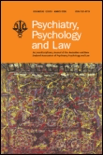
Psychiatry Psychology and Law
Exploring the Nexus of Mind and LawPsychiatry Psychology and Law is a prestigious journal dedicated to advancing the understanding of the interconnections among mental health, psychological conditions, and legal contexts. Published by Routledge Journals, Taylor & Francis Ltd, this journal plays a pivotal role in the field, evidenced by its impressive Q1 ranking in Law and notable positions in multiple disciplines such as Psychiatry and Forensic Medicine. With a commitment to disseminating high-quality research, it has established itself as an essential resource for researchers, professionals, and students in psychology and legal studies. While currently not offering Open Access options, the journal thrives on rigorous peer review processes that ensure only the most impactful studies from its inception in 1994 to the present are published. Covering a diverse range of topics, Psychiatry Psychology and Law fosters interdisciplinary dialogue and innovation, making it a vital platform for advancing scholarly discourse in the critical intersection of mental health and law.
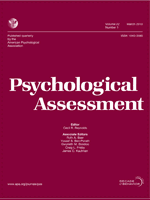
PSYCHOLOGICAL ASSESSMENT
Elevating Standards in Clinical Psychology ResearchPSYCHOLOGICAL ASSESSMENT is a prestigious journal published by the American Psychological Association that has been a cornerstone in the fields of Clinical Psychology and Psychiatry and Mental Health since its inception in 1989. With an impressive impact factor, this journal is ranked in the Q1 category for both related fields, showcasing its critical role in disseminating high-quality research and scholarly articles. The journal focuses on the development, validation, and application of psychological assessment tools, inviting contributions that enhance the understanding of mental health through rigorous methodological frameworks. As evidenced by its high Scopus rankings—66th in Clinical Psychology and 165th in Psychiatry and Mental Health—PSYCHOLOGICAL ASSESSMENT is indispensable for researchers, professionals, and students who seek to advance their knowledge and practice in psychological evaluation. While it is not an open-access journal, the insights provided are vital for anyone dedicated to the nuanced study of psychological assessment and diagnosis. For more information, visit the journal's page on the American Psychological Association's website.
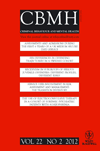
Criminal Behaviour and Mental Health
Exploring the Nexus of Crime and MindCriminal Behaviour and Mental Health, published by WILEY, is a pivotal journal that investigates the intricate relationships between criminal behavior and psychological health. With its ISSN 0957-9664 and E-ISSN 1471-2857, this journal serves as a vital resource for researchers and professionals in the fields of forensic psychology, psychiatry, and pathology. As a recognized publication in the Q3 category across multiple disciplines, including Medicine, Psychiatry, and Psychology as of 2023, it provides an essential platform for disseminating cutting-edge research and discussions pertinent to the intersection of criminality and mental health. Although currently not available as Open Access, the journal remains an influential part of the global academic landscape with a commitment to advancing understanding in this critical area. Its historical span from 1992 to 2024 signifies a long-standing dedication to exploring the complexities of mental health in the context of criminal behavior, making it an invaluable tool for students, practitioners, and researchers alike.

Journal of Criminological Research Policy and Practice
Transforming Policy through Cutting-Edge Criminological StudiesJournal of Criminological Research Policy and Practice is a pioneering platform dedicated to the exploration and dissemination of knowledge in the interdisciplinary field of criminology. Published by Emerald Group Publishing Ltd, this journal features high-quality research that addresses contemporary issues and innovative practices in areas such as law, public administration, and social psychology. With an ISSN of 2056-3841 and an E-ISSN of 2056-385X, the journal has garnered a notable presence in the academic community, showcasing a Q3 ranking in Law and Sociology & Political Science as of 2023. The journal provides valuable insights for researchers and practitioners alike, advancing the discourse on criminological policy and its implications for society. It serves as an essential resource for those invested in enhancing social justice, informing policy-making, and understanding the complexities of crime within a broader social context. Encompassing research from 2015 to the present and extending into 2024, the journal stands as a critical reference point for future studies and professional practice in criminology.